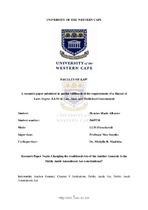| dc.contributor.advisor | Steytler, Nico | |
| dc.contributor.advisor | Maziwisa, Michelle R. | |
| dc.contributor.author | Alkaster, Henrico Mario | |
| dc.date.accessioned | 2020-11-27T11:39:41Z | |
| dc.date.available | 2020-11-27T11:39:41Z | |
| dc.date.issued | 2020 | |
| dc.identifier.uri | http://hdl.handle.net/11394/7584 | |
| dc.description | Magister Legum - LLM | en_US |
| dc.description.abstract | The majority of South Africa’s 257 municipalities are in a dire state as evidenced by the recent
reports of the Auditor-General (AG).
1 The Minister of Cooperative Governance and Traditional
Affairs revealed that only 7 percent of the country’s 257 municipalities are classified as wellfunctioning insofar as they are capable of carrying out their tasks adequately.2 From the
remaining municipalities, the Minister pointed out that 87 municipalities (31 percent) are
‘frankly dysfunctional’ meaning that service delivery in these municipalities is poor or at times
non-existent because of poor governance, inadequate financial management, and poor
accountability mechanisms. | en_US |
| dc.language.iso | en | en_US |
| dc.publisher | University of Western Cape | en_US |
| dc.subject | Auditor general | en_US |
| dc.subject | Chapter 9 institutions | en_US |
| dc.subject | Public Audit Ac | en_US |
| dc.subject | Public Audit Amendment Act | en_US |
| dc.title | Changing the traditional role of the Auditor general: Is the Public Audit Amendment Act constitutional? | en_US |
| dc.rights.holder | University of Western Cape | en_US |

